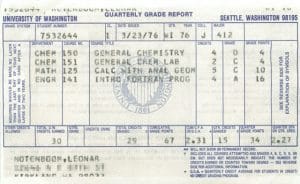In 1975 I’d applied to four colleges: The University of Washington, Washington State University, Gonzaga University, and Seattle University. Each application form had an entry that corresponded to some variation of “area of study.”
They each wanted to know what career path I would choose.
How the heck should I know? I was 17 at the time, doing all this during my senior year in highschool. I suppose some of my peers knew what they “wanted to be when they grew up,” and had for perhaps a long time, but I wasn’t one of them.
What I did know, from my own tinkering, along with some encouragement from a family friend, was that electronics and electrical devices were kind of interesting. I didn’t know what that meant in terms of a career, though, but, “electronics” is what I put down.
That one word changed my life.
I ended up getting accepted to all four schools, and ultimately elected to go to the University of Washington.
Based on my one word, whomever processed my application placed me in the UW’s College of Electrical Engineering. I emphasize “placed”, because as I understand it today you have to qualify — presumably you enroll in Engineering, and then apply for the more specific Electrical Engineering college. Something else I suppose I should be grateful to have avoided by sheer luck of timing.
And yet — while my degree is, indeed, a Bachelors in Electrical Engineering, it’s not the “Electrical” part that I built upon.

In my sophomore year I was making my way through the required prerequisites — chemistry was horrific, calculus difficult, and physics was kinda cool but not something I saw myself applying to daily life. I found myself in the required “Engineering 141 – Introduction to Fortran Programming”. Six words that changed my life.
I loved it. It didn’t matter that it was punch cards and batch processing (carefully arrange your deck of cards, submit it for processing, come back the next hour, after the next class, or the next day, only to find that you’d made a typo), it was my thing, instantly and completely. I ended up helping a couple of others through the class, and started down a path of computer geekiness that lasts to this day. In that class I found my passion, and in that class my career path was set.
I went from having no idea where I was headed, to being overjoyed that people would pay me to do this stuff.
While I remained in the Electrical Engineering program — the UW’s Computer Science program was just starting up — I took anything and everything computer related on the path to my degree. This led me to microprocessors, hardware interfaces, low level assembly language and more. Interestingly, having avoided the CS program, I had little formal knowledge of algorithms and data structures and other higher level, more conceptual thinking that the difference in approach encouraged. That didn’t mean I didn’t use them — in one of my Microsoft interviews I recall describing what turns out to be a general purpose memory management system that I’d never had the framework to think of in a fancier light. I was just solving the problem at hand.
I know not everyone has such a clear, defining, lightbulb moment in life’s path, but I did.
And I’m exceptionally grateful for the path that lead me there, to whomever placed me where I was placed, and whomever decided that Fortran programming was something that all engineers should encounter.
